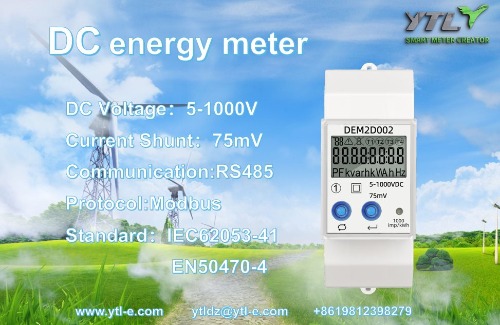With the vigorous development of electronic technology, electronic DC energy meters have become the mainstream for measuring DC energy. The number of application scenarios for DC energy meters is significantly lower than that of AC energy meters. However, with the advancement of new energy generation methods and electric vehicles, the scope of DC meter usage has broadened, leading to a considerable increase in their demand. DC energy meters, which combine electronic technology with IoT communication technology and other advancements, have expanded their applications to better address market needs.
Electronic DC energy meters have numerous advantages. Some of these include:

1. High accuracy:
Electronic DC energy meters utilize electronic measurement principles and offer greater measurement accuracy. Compared to traditional mechanical energy meters, electronic DC energy meters have a smaller error range and can measure energy more accurately.
2. Wide range:
Electronic DC energy meters have a wide range of measurements and can adapt to energy measurement under varying loads and power factors. Whether it is under low-load or high-load conditions, the energy meter can accurately measure energy.
3. Small startup current:
Electronic DC energy meters have a smaller startup current that is more suitable for measuring small loads. When the load current is less than a certain value, mechanical energy meters may not start or produce large errors. However, electronic DC energy meters can still accurately measure energy.
4. Anti-tampering:
Electronic DC energy meters adopt electronic encryption technology, which can effectively prevent illegal tampering and electricity tamper. Compared to traditional mechanical energy meters, electronic DC energy meters have higher security and reliability.

5. Automated Meter Reading:
Electronic DC energy meters have the ability to perform automated meter reading functions by transmitting energy data to computers or power monitoring systems via data communication interfaces. This greatly reduces the costs and errors associated with manual meter readings, while also increasing the efficiency and accuracy of meter readings.
6. High reliability:
Electronic DC energy meters utilize electronic components and integrated circuits internally, making them more reliable and stable than their mechanical counterparts found in mechanical energy meters. In addition, electronic DC energy meters also possess self-diagnosis functions that can detect and report any internal faults, thereby ensuring their normal operation.
7. Long lifespan:
Due to their different internal structures and measurement principles, the lifespans of electronic DC energy meters are generally longer than those of mechanical energy meters. Under normal working conditions, the lifespan of electronic DC energy meters can exceed ten years.

8. Strong compatibility:
Electronic DC energy meters typically possess multiple communication interfaces and protocols that enable them to communicate and interact with various computer systems, programmable logic controllers (PLCs), distributed control systems (DCS) and other devices. This allows users to select appropriate communication methods and system architectures based on their specific requirements.
9. Remote control capability:
Users can remotely monitor and control electronic DC energy meters through communication interfaces and network connections. This makes energy measurement and management more convenient and efficient.
These advantages of electronic DC energy meters have made them widely used in industrial, commercial, and residential areas, making them an indispensable measuring instrument in modern power systems. DC energy meters, being measurement devices, must adhere to pertinent standards and acquire certification from reputable organizations prior to their sale. In the European Union market, companies must adhere to the IEC 62053-41 and EN 50470-4 standards and acquire MID certification.

 English
English 中文简体
中文简体











.jpg?imageView2/2/w/500/h/500/format/png/q/100)



